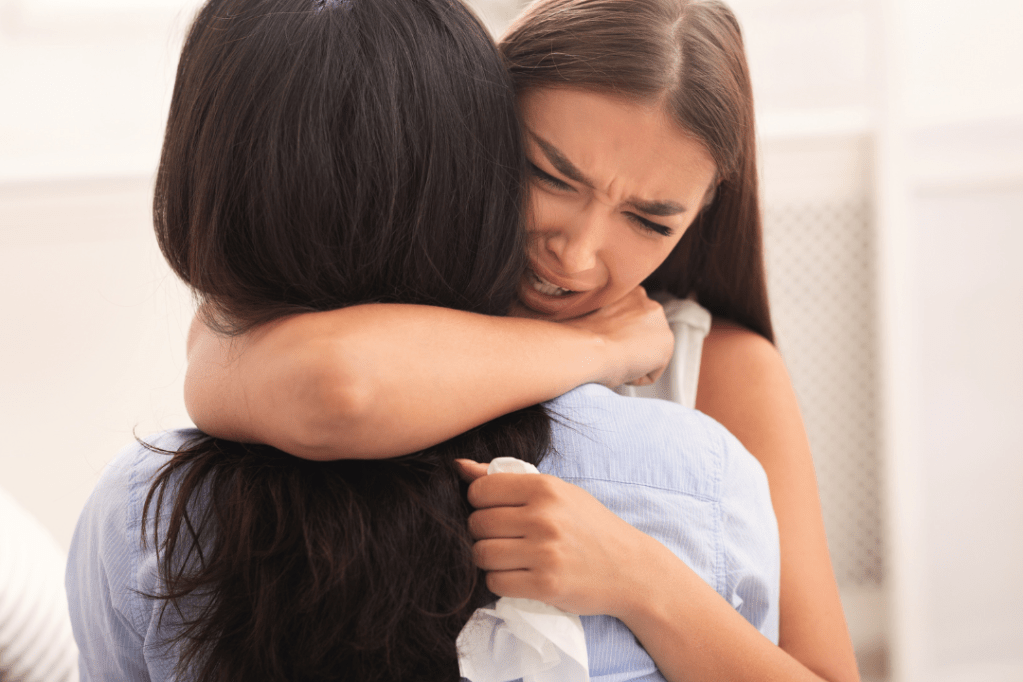Imagine this: you’re scrolling through Instagram and suddenly come across photos of your former best friend living their best life—without you. Your stomach drops to the floor, every muscle in your chest tightens, and, without warning, you’re sniffling over someone who once knew your Jamba Juice order by heart (medium Strawberry Whirl with a caffeine boost) but now treats you like a stranger.
If this resonates with you, know that you’re not alone. Friendship breakups are one of life’s most devastating experiences, yet society either chooses to ignore them altogether or expects us to “get over it,” as if it’s no big deal.
Spoiler alert: it is a big deal. And we have the science to back it up.
The science and psychology behind friendship breakups
Here’s something that might surprise you: when a friendship ends, your brain processes it in much the same way as it would a romantic breakup. The same neural pathways light up, the same stress chemicals flood into your system, and you feel like your heart is breaking into a million tiny pieces.
Ugly crying into a pint of ice cream would not be uncalled for in this situation.
Research shows that up to 70% of close friendships don’t make it past the seven-year mark. This doesn’t mean that we’re bad at friendship; rather, it’s a reflection of the fact that people change, grow apart, and that life unfolds in unexpected ways. However, knowing the statistics doesn’t make a friendship breakup any less brutal when you’re experiencing it firsthand.
When you lose a close friend, your brain goes into emergency panic mode. Known as the mood stabilizer, serotonin levels drop after losing a friend, leading to mood instability, anxiety, and depression symptoms. The brain goes through dopamine withdrawal, creating feelings of emptiness and a loss of pleasure.
Your amygdala—the brain’s alarm system—freaks out, sending waves of stress signals through your body. Simultaneously, the same regions that process physical pain (the ones that would activate if you broke a bone) start working overtime to process that emotional pain.

This is why we use physical terms to describe heartbreak, like “crushed,” “broken,” or “torn apart.” Because in these moments, your brain truly cannot distinguish between physical and emotional pain.
The grief no one talks about
Friendship breakups can be especially painful because our society isn’t built to acknowledge them. When a romantic relationship ends, friends and family typically gather around to offer emotional support and say things like, “You’re better off, sweetie,” or “It’s their loss.”
But when a friendship falls apart? Crickets.
Unlike other forms of loss, friendship endings involve ambiguous grief: mourning someone who is still alive but is no longer present in your life.
This phenomenon is also known as “disenfranchised grief,” and refers to the type of pain that does not receive social recognition or support. A friend is someone who has left an indelible mark on your life, and yet, society tells you to get over it because, after all, it’s “just a friend.”
“Losing a close friendship can hurt just as deeply as a romantic breakup, if not more in some cases,” explains Charlotte Fox Weber, psychotherapist and author of What We Want, in an interview with Stylist.
“You’re not just mourning the present reality of the friendship; you’re grieving what it once was—the laughter, the shared experiences, the dreams you built together, and the promise of what life might become.”
Healing happens in stages
The good news is that you’re not broken. This pain will not last forever. Healing from a friendship breakup, much like any other form of grief, happens in waves. Some days you’ll feel fine, while others you may want to hide under the covers and stare at old pictures of the two of you. The “good old days.”
First, allow yourself to feel everything. Seriously. Be sad, angry, confused, hurt. Hurl the dictionary and the thesaurus at your grief. Cry in the shower. Scream in the car. Your feelings are valid, even if no one else seems to recognize them.
Next, practice self-compassion. Talk to yourself kindly and use words full of love. If a family member was going through something similar, would you tell them they were being dramatic? Hopefully not! You would wrap them in a tight hug and remind them that they are worthy of love and friendship.
Finally, get curious about the lessons this experience has taught you. What have you learned about yourself through this friendship? What do you want to do differently in future relationships? Pain can often be our greatest teacher, even if you prefer to learn your lessons more gently.
Plot twist: You’re stronger now
Here’s something no one tells you about surviving a friendship breakup: it makes you resilient. Look at you! You have navigated through one of life’s most under-recognized heartbreaks and emerged in one piece. You sat with difficult emotions, comforted yourself, and became your own best friend when you needed one the most.
That’s not insignificant; that’s everything.
So, take your time. Feel your feelings. Be gentle with yourself. And remember, almost everyone has experienced a loss like this at some point. You’re not behind in life; you’re exactly where you need to be.







































